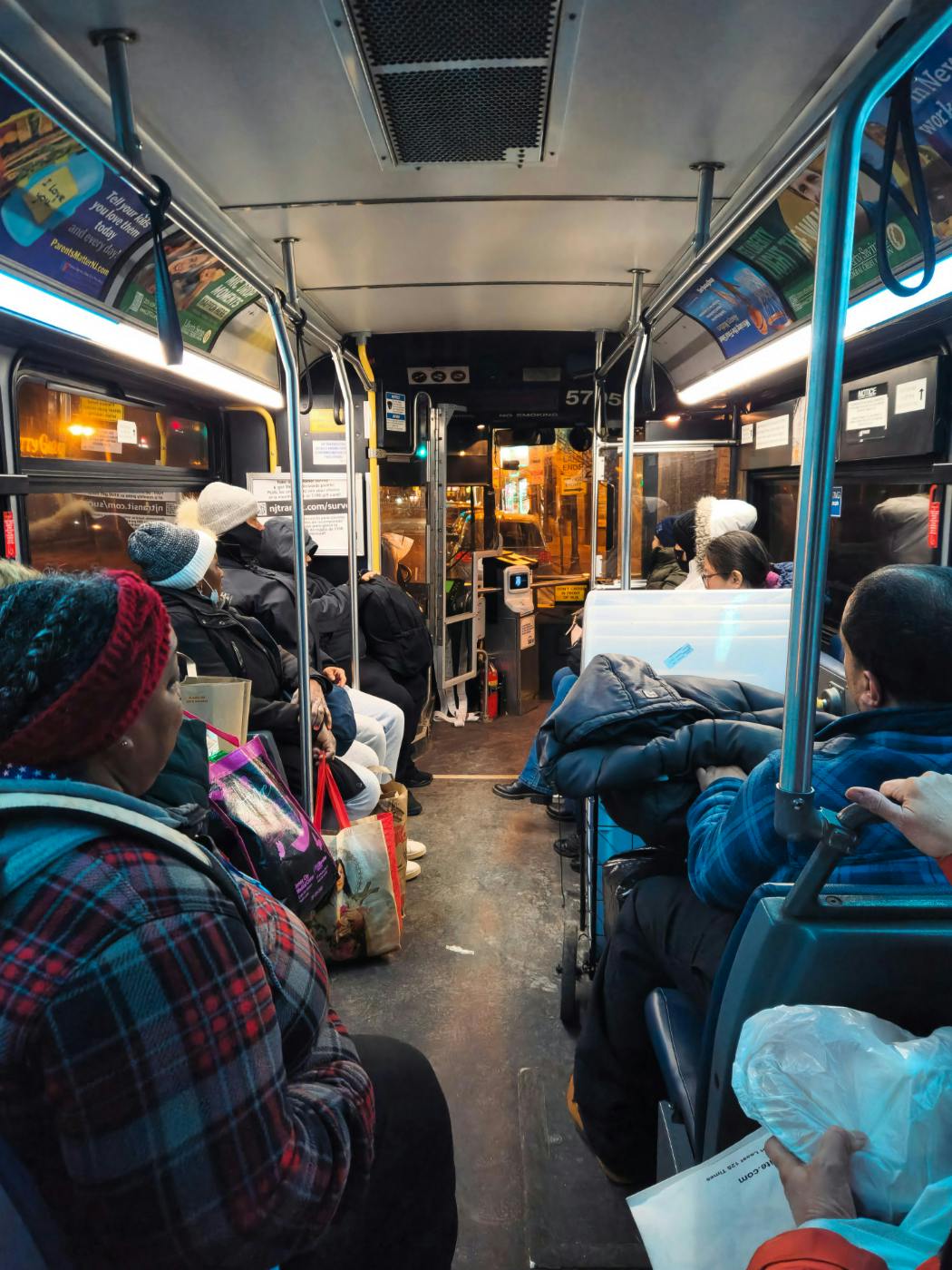
Why should a marketing director or project lead care? Because public space is rehearsal space. The phrases we hurl on the platform ride with us into Monday stand‑ups, Slack threads, and client calls.
Public transportation is not something to sneeze at. I love trains—the steady motion, the gentle rocking, the way a late‑night subway hum feels like the city’s heartbeat under your feet. And buses? Beautiful. You sit back, let someone else tame the traffic, and watch the human zoo of life unfold two rows up. For fifteen years, from Manhattan’s 2‑train to Salt Lake’s TRAX to Seattle’s Route 124, I rode without owning a car and never felt deprived.
Yet lately, that rolling living room has gotten spiky. The small, civil exchange—“Please, take my seat.” “Why, thank you.”—now risks detonating into: “What’s up, what’s up, you stepping to me? You think I can’t stand?!” The volume is up, sure, but the real danger is the vocabulary. Last month on LA’s Metro Rapid, I overheard a seat dispute flip from “Bro, I’m good” to “Touch me again and see what happens” in less time than the doors stayed open. Nobody threw a punch, but the language left a bruise you could feel all the way to Union Station. I don’t pine for starched hats and lace gloves, and I’m not here to freeze language in amber. English is a living beast; new slang is half the fun of eavesdropping. What worries me is not evolution but escalation—the hair‑trigger leap from offer to outrage that skips every courtesy in between.
Gentle nouns morph into slurs; basic verbs mutate into threats; whole conversations skip the polite decline and land straight on profanity that would make my Irish cousins blush harder than they do on St. Pat’s after three green beers.
Why should a marketing director or project lead care? Because public space is rehearsal space. The phrases we hurl on the platform ride with us into Monday stand‑ups, Slack threads, and client calls. Let that nasty script take root and soon the office chat reads like a comment section on fire—and clients quietly hire companies that still sound like adults.
This isn’t a yearning for lace‑glove etiquette. It’s a field manual for staying human when the default setting has drifted to flame‑thrower. Three true transit episodes illustrate how our language mutated, followed by a toolkit for swapping verbal nukes back to everyday nouns. If you can navigate a crowded bus without lobbing an F‑bomb, you can keep a product launch from derailing too.

Episode 1 – Seat Offered, World Keeps Turning
Mid‑afternoon, 1974, Boston’s Orange Line rattles under the city like a loose quarter in a dryer. I’m ten, my feet barely brushing the floor, transfixed by the thunk‑thunk cadence of steel on rail, when a woman climbs aboard, balancing two grocery bags and a cane. Before my brain can vote, my legs obey every rule my mother drilled into them: stand, smile, point to the seat. She settles with a relieved sigh, pats my hand, and releases the sweetest “Thank you, young man” I’ve ever earned. Newspapers dip, strangers nod, and somewhere behind me, a gent murmurs, “Kid was raised right.” The train rolls on a little lighter.
Courtesy didn’t need a cheer squad; it was just the operating system. A handful of words—please, thank you, young man—ferried respect from one stranger to another and kept the whole carriage running smoother than MBTA timetables usually allow.
Fast‑forward to the workplace, and the code still compiles. The quick “Morning, all” that acknowledges every square in a Zoom grid, the genuine “Appreciate you catching that” before a typo hits the client deck—micro‑gestures that keep projects humming the way that old Orange Line car hummed down the tracks.
Scripts, of course, evolve. A decade or two later, offering a seat didn’t always land quite so cleanly…
Episode 2 – The Gentle “No, Thanks”
June 2015, Salt Lake City TRAX, late‑morning run toward downtown. The car smells faintly of sunscreen and the caramel corn stand outside Vivint Arena. I’m on my feet reading station maps when a woman steps aboard—smart blazer, laptop bag, heels designed by some guy getting revenge on his high school prom date for standing him up. Old reflex fires: I smile, tip my head toward the empty space I’ve just vacated, and say, “Seat’s yours if you’d like it.”
She doesn’t scowl, roll her eyes, or shout. She just plants her feet wider, grips the post, and answers with quiet conviction: “I’m a strong, independent woman; I’m good, thanks.” No heat, no shade—just a boundary drawn with permanent marker. For half a second, my inner voice wonders if I’ve become that “old‑fashioned” guy, offering help no one asked for. But her calm tone teaches a new rule: respect now includes autonomy. The fix isn’t to ditch politeness; it’s to install an extra prompt: Ask first. I nod, swing the strap of my backpack higher, and the train glides on while both of us stay perfectly upright.
That tiny exchange rewrote a line of code in my courtesy program. Same language as 1974—offer, thank you, or decline—but the subtext had changed: respect now included autonomy. The old assumption (woman + heavy bag = needs help) could read like pity, even paternalism. The fix wasn’t to ditch politeness; it was to install an extra prompt: Ask first.
The office version looks like this: before you leap in with feedback, check whether your teammate wants real-time notes or a follow‑up email. One designer beams under public praise; another shrinks like a vampire in daylight. Respect is no longer one‑size‑fits‑all; it’s custom‑tailored, like those dangerous heels.
Scripts continue to evolve, of course. A few years later, a simple “ma’am” would light the fuse in Episode 3…

Episode 3 – “Ma’am” Lights the Fuse
October 2024, Seattle’s Link light rail toward Sea‑Tac, morning rush. The car is sardine‑tight; overhead bins rattle like loose cymbals. A guy in a Patagonia vest half‑stands for a woman juggling a roller suitcase and a latte. He offers with practiced politeness: “Ma’am, take my seat.”
What follows is less conversation, more mortar fire. “I ain’t no ma’am! You think I’m weak? Step off, old‑timer!” Her words slice through the car, followed by profanity that makes the metal walls ring. The would‑be gentleman’s ears redden. Passengers pretend to study their phones while sneaking sideways glances—the kind that say thank God it’s not me. One teenager toggles his music louder; an older couple leans shoulder to shoulder, eyes fixed on the ad for escorts, which they find too embarrassing to look at but less embarrassing than being under the gaze of the ranting woman.
At the very next stop—Tukwila International Boulevard—the doors hiss open and the man bolts out, three stations short of wherever he was headed. Through the window, I watch him spin in place, suitcase nowhere in sight, eyes wide as if he’s been dropped in another time zone. He pats his pockets, checks the station map twice, and finally pulls out his phone like a compass. The train pulls away, leaving him framed in the glass: one small figure marooned on the platform because a stranger’s gratitude turned into shrapnel.
The problem isn’t just volume; it’s vocabulary sharpened to cut before the other person can blink. That reflex shows up at work, too: reply‑all rants, Slack tirades, rage‑tweets that outlive the apology. When words turn into weapons, everyone grabs armor, and collaboration sputters.
We can’t bubble‑wrap every interaction, but we can steer language back toward problem‑solving. A steady “I hear you” beats a half‑baked takedown; a calm calendar invite cools a digital shouting match. The commute reminds us we’re on the same track—different baggage, shared destination.

Word Choice Toolkit – Practical Phrases to Keep Things on the Rails
We just watched the same six‑word gesture—“Here, take my seat.”—land three different ways: welcomed, politely declined, and exploded like a firecracker. Words are matchsticks: strike them well and they light a candle; strike them carelessly and the couch goes up in smoke. Along with half a pizza, your best bong, and the rent check. The moves below turn heat into light, action into dialogue, and keep a Monday stand‑up from feeling like that Sea‑Tac meltdown.
- Pause → Paraphrase → Proceed
Hit the brakes for four seconds, then lead with: “Just so I’m tracking…” Mirror back what you heard. Half the time, the other person corrects themselves, saving you a round of email dodgeball.
- Swap Labels for Facts
Replace “You’re unreliable” with “We’ve slipped the timeline twice.” Facts invite solutions; labels invite lawsuits.
- Own the Feeling, Not Their Character
“I’m frustrated we lost the file” lands softer—and more honestly—than “You’re careless.” Feelings are negotiable; personal attacks get screenshot‑forwarded to HR.
- Ask Before Advising
Before you whip out the PowerPoint cavalry, try: “Would it help if…?” It keeps autonomy on the table and stops you from becoming the office equivalent of the guy rearranging strangers’ luggage.
- Agree on a Cooling‑Off Clause
When a thread spikes red‑hot, anyone can call “Two‑breath break, back in five.” It’s a verbal handbrake that keeps flame wars from torching goodwill.
- Maintain a Living Lexicon
Create a shared doc titled Words We Like, Words We Spike. Green‑lights: thanks, please, let’s. Red flags: always, never, obviously (plus your own corporate F‑bombs).
- Default to Gratitude
Ending an email with “Appreciate your time on this” costs nothing and deposits $50 in the relationship bank. Repeat as needed.
Consider these phrases quick‑reference ink worth tattooing on your forearm if that’s what it takes to reach for them when tempers spike. Master them on the commute, and you’re already halfway to using them in the conference room.
Summing Up
From a ten‑year‑old’s instinctive kindness to a commuter’s profanity‑laced exit, the ride shows a simple algorithm: Language → Reaction → Culture. The words we choose—on a train, in a meeting, or in a late‑night Slack—either grease the track or jam the brakes. Small courtesies earn compound interest: they lower blood pressure in the moment and build reputations over quarters. Autonomy‑aware questions (“Need a hand?”) signal respect without presumption. And yes, the wrong pronoun, tone, or throwaway label can jackknife a project faster than a bus in black ice.
If every commute is practice for the office, then every "thank you" or "no, thanks" is a rehearsal note. Keep the script sharp—pause, paraphrase, label the facts—and you’ll arrive at work with trust already in your pocket. Clients notice. Teams relax. Deadlines survive. Turns out the best KPI might be how calmly we can stand in a crowded car.
Open Question
If tomorrow’s commute is rehearsal for tomorrow’s client call, what words will we pack before we leave the house?

